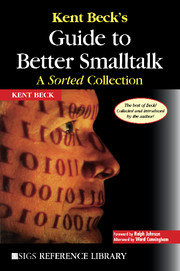Book contents
- Frontmatter
- Contents
- FOREWORD
- PREFACE
- INTRODUCTION
- 1 A DIAGRAM FOR OBJECT-ORIENTED PROGRAMS
- 2 CONSTRUCTING ABSTRACTIONS FOR OBJECT-ORIENTED APPLICATIONS
- 3 PLAYRGOUND: AN OBJECT ORIENTED SIMULATION SYSTEM WITH AGENT RULES FOR CHILDREN OF ALL AGES
- 4 A LABORATORY FOR TEACHING OBJECT-ORIENTED THINKING
- 5 THINK LIKE AN OBJECT
- 6 WHY STUDY SMALLTALK IDIOMS?
- 7 THE DREADED SUPER
- 8 ABSTRACT CONTROL IDIOMS
- 9 VALUEMODEL IDIOMS
- 10 COLLECTION IDIOMS
- 11 AN OBJECTWORKS\SMALLTALK 4.1 WRAPPER IDIOM
- 12 A SHORT INTRODUCTION TO PATTERN LANGUAGE
- 13 WHOLE LOTTA SMALLTALK: THE TECHNOLOGY
- 14 INSTANCE-SPECIFIC BEHAVIOR: HOW AND WHY
- 15 INSTANCE-SPECIFIC BEHAVIOR: DIGITALK IMPLEMENTATION AND THE DEEPER MEANING OF IT ALL
- 16 TO ACCESSOR OR NOT TO ACCESSOR
- 17 INHERITANCE: THE REST OF THE STORY
- 18 INHERITANCE: THE REST OF THE STORY (CONT.)
- 19 HELPER METHODS AVOID UNWANTED INHERITANCE
- 20 IT'S NOT JUST THE CASE
- 21 CRC: FINDING OBJECTS THE EASY WAY
- 22 DEATH TO CASE STATEMENTS
- 23 WHERE DO OBJECTS COME FROM?
- 24 PATTERNS AND SOFTWARE DEVELOPMENT
- 25 DISTRIBUTED SMALLTALK
- 26 WHERE DO OBJECTS COME FROM? FROM VARIABLES AND METHODS
- 27 BIRDS, BEES, AND BROWSERS—OBVIOUS SOURCES OF OBJECTS
- 28 USING PATTERNS: DESIGN
- 29 PATTERNS GENERATE ARCHITECTURES
- 30 SIMPLE SMALLTALK TESTING
- 31 ARCHITECTURAL PROTOTYPE: TELEVISION REMOTE CONTROL
- 32 DEMAND LOADING FOR VISUALWORKS
- 33 GARBAGE COLLECTION REVEALED
- 34 WHAT? WHAT HAPPENED TO GARBAGE COLLECTION?
- 35 SUPER + 1
- 36 CLEAN CODE: PIPE DREAM OR STATE OF MIND?
- 37 A MODEST META PROPOSAL
- 38 USES OF VARIABLES: TEMPS
- 39 VARIABLES OF THE WORLD
- 40 PATTERNS 101
- 41 FAREWELL AND A WOOD PILE
- AFTERWORD
- INDEX
1 - A DIAGRAM FOR OBJECT-ORIENTED PROGRAMS
OOPSLA '86 Proceedings
Published online by Cambridge University Press: 04 August 2010
- Frontmatter
- Contents
- FOREWORD
- PREFACE
- INTRODUCTION
- 1 A DIAGRAM FOR OBJECT-ORIENTED PROGRAMS
- 2 CONSTRUCTING ABSTRACTIONS FOR OBJECT-ORIENTED APPLICATIONS
- 3 PLAYRGOUND: AN OBJECT ORIENTED SIMULATION SYSTEM WITH AGENT RULES FOR CHILDREN OF ALL AGES
- 4 A LABORATORY FOR TEACHING OBJECT-ORIENTED THINKING
- 5 THINK LIKE AN OBJECT
- 6 WHY STUDY SMALLTALK IDIOMS?
- 7 THE DREADED SUPER
- 8 ABSTRACT CONTROL IDIOMS
- 9 VALUEMODEL IDIOMS
- 10 COLLECTION IDIOMS
- 11 AN OBJECTWORKS\SMALLTALK 4.1 WRAPPER IDIOM
- 12 A SHORT INTRODUCTION TO PATTERN LANGUAGE
- 13 WHOLE LOTTA SMALLTALK: THE TECHNOLOGY
- 14 INSTANCE-SPECIFIC BEHAVIOR: HOW AND WHY
- 15 INSTANCE-SPECIFIC BEHAVIOR: DIGITALK IMPLEMENTATION AND THE DEEPER MEANING OF IT ALL
- 16 TO ACCESSOR OR NOT TO ACCESSOR
- 17 INHERITANCE: THE REST OF THE STORY
- 18 INHERITANCE: THE REST OF THE STORY (CONT.)
- 19 HELPER METHODS AVOID UNWANTED INHERITANCE
- 20 IT'S NOT JUST THE CASE
- 21 CRC: FINDING OBJECTS THE EASY WAY
- 22 DEATH TO CASE STATEMENTS
- 23 WHERE DO OBJECTS COME FROM?
- 24 PATTERNS AND SOFTWARE DEVELOPMENT
- 25 DISTRIBUTED SMALLTALK
- 26 WHERE DO OBJECTS COME FROM? FROM VARIABLES AND METHODS
- 27 BIRDS, BEES, AND BROWSERS—OBVIOUS SOURCES OF OBJECTS
- 28 USING PATTERNS: DESIGN
- 29 PATTERNS GENERATE ARCHITECTURES
- 30 SIMPLE SMALLTALK TESTING
- 31 ARCHITECTURAL PROTOTYPE: TELEVISION REMOTE CONTROL
- 32 DEMAND LOADING FOR VISUALWORKS
- 33 GARBAGE COLLECTION REVEALED
- 34 WHAT? WHAT HAPPENED TO GARBAGE COLLECTION?
- 35 SUPER + 1
- 36 CLEAN CODE: PIPE DREAM OR STATE OF MIND?
- 37 A MODEST META PROPOSAL
- 38 USES OF VARIABLES: TEMPS
- 39 VARIABLES OF THE WORLD
- 40 PATTERNS 101
- 41 FAREWELL AND A WOOD PILE
- AFTERWORD
- INDEX
Summary
My programming partner Ward Cunningham taught me to avoid complexity. In spite of my blue-chip, Silicon Valley brat credentials, I was never a very good programmer. Ward has more programming talent than I do, but he still programs simpler stuff, not because he must, but because he chooses. That is a big part of my success to date—picking development priorities and ignoring interesting side issues.
This was my first technical article. I was lucky to write it with Ward, because he had a pretty good handle on how to focus an article. That was the lesson of this paper for me—focus. I can remember discussing for days what the one single point was we wanted a reader to take away. That was a powerful lesson, and a bit painful, too. Ward and I had been working on lots of exciting stuff. I wanted to talk about all of it. Ward leaned and leaned on finding the one point that stood above all others. Finally we hit on this one.
The article introduces the Cunningham Diagram, a diagram with much the same information in it as Jacobson's Interaction Diagram, but (to my eyes, anyway) much more artistically rendered. As far as impact goes, this paper was a dud. The two good ideas here—the diagram itself and a tool for constructing it from running code—both disappeared without a trace.
Information
- Type
- Chapter
- Information
- Kent Beck's Guide to Better SmalltalkA Sorted Collection, pp. 1 - 14Publisher: Cambridge University PressPrint publication year: 1997
